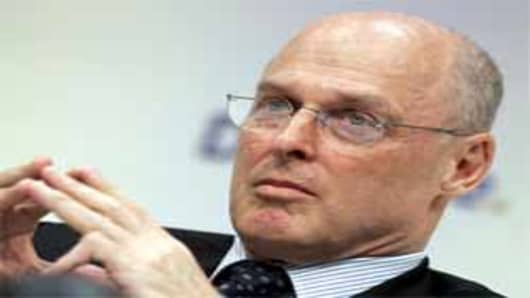U.S. Treasury Secretary Henry Paulson on Monday defended the dollar's status as the world's reserve currency and said its recent decline was only a small factor behind a surge in oil prices.
"The U.S. dollar has been the world's reserve currency since World War Two and there is a good reason for that.
The United States has the largest, most open economy in the world, and our capital markets are the deepest and most liquid," Paulson said in prepared remarks to a business group in the United Arab Emirates.
Paulson's comments mark a slight strengthening of his language on the dollar and could resonate with Gulf oil producing states that are struggling with soaring inflation and may be re-evaluating their currency pegs to the dollar.
"I have repeatedly stated that a strong dollar is in our nation's interest," he said.
Paulson pledged to deal with problems in the U.S. economy that have hurt the dollar's value in recent months.
"I am committed to promoting policies that enhance the underlying competitiveness of the U.S. economy and ensure that the dollar remains the world's reserve currency," he told the U.S.-UAE Business Council.
"These include being a strong advocate for open investment and trade, and working to address the current challenges in our economy, including the housing correction and stress in our capital markets."
He said the dollar's value would ultimately reflect strong U.S. long-term fundamentals and the Bush administration was responding "aggressively and comprehensively" to U.S. economic challenges to minimize the impact globally.
"But we also take confidence from the fact that the performance of the U.S. economy for the past five decades is unmatched and its long-term fundamentals compare favorably today to any advanced economy in the world," he said.
Small Factor
Paulson reaffirmed his view that speculation and dollar weakness were not to blame for soaring oil prices and the only way to relieve oil market pressure was to better balance supply and demand.
He called for more international investment in both oil production and alternative fuels, while "market distorting" fuel-price subsidies in many countries should be abandoned.
"High oil prices are the result of supply and demand factors that are likely to persist for some time," he said.
"Supplies have been affected by low capacity expansion and declining yields, while demand has surged largely due to growth in emerging markets," he said.
"Speculation and the depreciation of the dollar are likely only small factors behind oil price increases."
Paulson's comments on the causes of record prices that touched $135 per barrel last week are at odds with many economists and officials in oil-producing countries who say dollar weakness and speculative activity has sparked increased flows of capital into oil from other asset classes.
The Organization of Petroleum Exporting Countries says world oil markets are well supplied.
"There is no need to be pessimistic about oil supply," OPEC head of research Hasan Qabazard told reporters in Dubai last week.
"There are enough investments to meet demand."
Oil Price Pain
Paulson spoke of the pain now being experienced by western economies from high fuel costs.
"Record high oil prices are putting a large burden on the world economy and creating hardships for families, households and industries everywhere. This threatens to exacerbate economic volatility in the Gulf and abroad," he said.
Paulson also said opening up the Gulf economies to foreign investment and trade will make them more prosperous and stable.
"Remaining closed to investment will have the opposite effect, by inhibiting growth and magnifying domestic economic vulnerabilities," Paulson said.
"The Gulf's past is a reminder of this lesson -- when oil prices were low the region endured years of lackluster growth and declining living standards," he said.
He commended Abu Dhabi for new investments in upstream production and domestic refining capacity through partnerships with foreign companies.
"More liberalization along these lines would benefit all oil producing countries," he said.
Gulf oil-producing nations awash in petrodollars are experiencing rising inflation, and Paulson said measures such as price controls and wage increases were "likely to exacerbate the problem."


